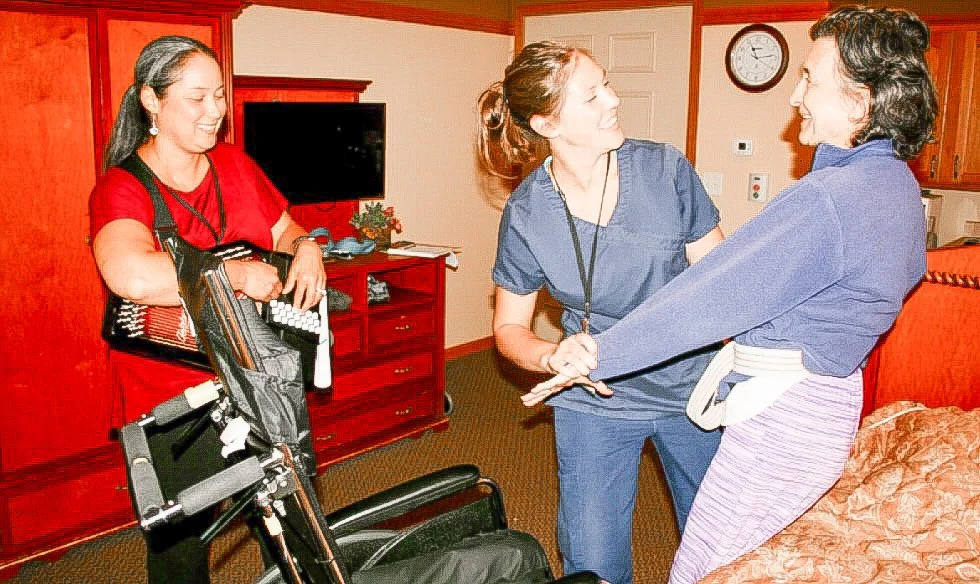What is Parkinson’s Disease (PD)? PD is a degenerative disorder of the central nervous system (Magee, 2013). Symptoms begin slowly and may be barely noticeable such as tremor in one hand. Other symptoms include stiffness, moving slowly, impaired posture and balance, lack of facial expressions, changes in writing, and soft or slurred speech. Causes of PD include environmental toxins, genetic factors, Lewy bodies in the brain or Alpha-synuclein found within Lewy bodies. The average age of someone being diagnosed with PD is 60 or older. It is rare for someone younger to be diagnosed with PD, but it is possible. Women are less likely than men to be diagnosed with PD. Currently there is no cure for PD, but there are medications to improve symptoms and surgery can help regulate the affected regions of the brain (Mayo Clinic, 2024).
How can music therapy help people diagnosed with PD? Music therapy has been shown to improve motor skills, mood and coping skills, and voice quality. Interventions used to improve PD symptoms include rhythmic auditory stimulation (RAS) and group singing. RAS is a music therapy technique that addresses motor control in rehabilitation by using rhythmic cues to cue motor movements. Group singing is a music therapy technique that uses singing in a group to address speech goals and gives the person the opportunity to socialize with others.
A study done by Chumma (2007) uses RAS to treat gait disorder in those with PD. Gait disorder causes imbalance, shuffling, frequent falls, staggering, and freezing. RAS was used to keep a steady beat during exercises. The results showed improvement in the patience’s motor function and the possible benefits of RAS during exercise training (Chumma, 2007).
An interview with a music therapist Ruth Breuer conducted by Williams (2019), discusses the use of regulative music therapy to address a client with PD’s mood and coping skills. Breuer used mindfulness exercises in addition to regulative music therapy (Williams, 2019). During the interview, Breuer shared that regulation music therapy encouraged discussion and the development of coping skills (Williams, 2019).
Another study conducted by Elefant et al (2012), worked on speaking, singing quality, and depression symptoms with those diagnosed with PD. Some people with PD have difficulties with speaking and may avoid social situations (Elefant et. al., 2012). This study had 10 participants and was conducted over the course 20 weeks. The music therapist used group voice and singing techniques in weekly sessions. The results of the study showed improvements in their voice and singing range, but not in their speech quality. Even though their speech quality did not improve, the quality of their speech did not decrease (Elefant et. al., 2012). The data supports the use of group singing to improve the quality of a person’s voice with PD. However, more research needs to be done to see all the benefits that this method has to offer.
Music therapy has many benefits for treating those with PD. As the research demonstrates, music therapy can improve motor skills, mood and coping skills, and voice quality. Further research will certainly continue to support these and other benefits.
-Teresa Dominguez, Music Therapy Intern
References
Chuma, T. (2007). Rehabilitation for patients with Parkinson’s disease. J Neurol 254, IV58-IV61. https://doi.org/10.1007/s00415-007-4010-1
Elefant, Cochavit, PhD., M.T., Baker, Felicity A, PhD., R.M.T., Lotan, Meir, M.ScP.T., PhD., Lagesen, S. K., M.A., & Skeie, Geir Olve,M.D., PhD. (2012). The Effect of Group Music Therapy on Mood, Speech, and Singing in Individuals with Parkinson's Disease - A Feasibility Study. Journal of Music Therapy, 49(3), 278-302. https://ezproxy.queens.edu/loginurl=https://www.proquest.com/scholarly-journals/effect-group-music-therapy-on-mood-speech-singing/docview/1181173563/se-2?accountid=38688
Magee, Wendy I. (2013). Guidelines for Music Therapy Practice in Adult Medical Care. Barcelona Publishers.
Mayo Clinic (2024). Mayo Foundation for Medical Education and Research. (2024, April 5). Parkinson’s disease. Mayo Clinic. https://www.mayoclinic.org/diseases-conditions/parkinsons-disease/symptoms-causes/syc-20376055
Williams, E. T. (2019). Development of Regulative Music Therapy guidelines for early to mid-stage Parkinson's disease. The Australian Journal of Music Therapy, 30, 54-66. https://ezproxy.queens.edu/login?url=https://www.proquest.com/scholarly-journals/development-regulative-music-therapy-guidelines/docview/2407609042/se-2?accountid=38688

